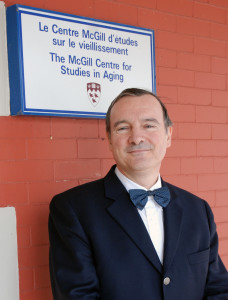“My hope is that – as chairman of the Ethical, Legal, and Social Issues program of the CCNA – I can facilitate the interaction between the CCNA and the future federal government to develop a national plan against dementia.” Dr. Serge Gauthier

It’s not just about funding. Providing better diagnostic services and supports for dementia care throughout Canada requires allocating funds more strategically, according to Dr. Serge Gauthier. And this is what his vision of a national plan could help to facilitate.
Developing and mobilizing this plan is the job not of politicians, but of citizens, Gauthier explains. “Individuals, families, and clinicians can, together, build and reach consensus to make recommendations to the federal government to uptake a national plan.” Echoing this sentiment, one of CCNA’s partner organizations – the Alzheimer Society of Canada – is encouraging citizens to take action and have their voices heard before the next federal election by getting involved in a new Alzheimer Society campaign.
Looking forward, Gauthier suggests that we can gain great insight by examining other disease models. Cancer models, for instance, propose assigning individual patients to a case nurse from the point of diagnosis. This continuity enables an established standard of care, just as it allows satisfactory and effective consultations. Infectious disease models are also valuable starting points, insofar as they emphasize understanding an individual’s biological profile and the genetic markers of a disease. Possessing this information is what enables researchers to detect diseases in their early stages and tailor medication to the individual, using “combination therapy,” to slow disease progression.
Adapting these models to dementia may not only enable personalized care and medicine for those living with dementia then, but may also enable targeting specific populations who are “at greatest risk.” Targeting is essential, Gauthier explains, given the “cost and varying efficacy of medications.” Consistent with this view, two recent articles featured in the Globe and Mail and Maclean’s show the ever-widening impact of dementia in our country.
Gauthier goes on to tell us that “the rarest (1%) are younger people under 60 years old, with a family history of Alzheimer’s disease that is dominantly inherited. Then, there’s about 15% of the Canadian population who carry a common gene, ApoE4. Although this gene doesn’t cause the illness, it increases the risk.”
Applying these insights, the CCNA program Dr. Gauthier chairs – Ethical, Legal, and Social Issues (ELSI) – has developed projects, such as recruiting people who are more “at risk” than others for an intervention, so that they can, in turn, be given scientifically validated advice related to prevention.
ELSI also aims to anticipate the ethical and legal considerations of the research undertaken throughout the CCNA. Specifically, the ELSI program is made up of a group of experts from diverse backgrounds that provide advice and support on complex ethical, legal, and social issues as they relate to CCNA research activities. Current consultation focuses on outlining the best approaches to ensure data is kept anonymous, and recommendations for a comprehensive consent process for research participants of Platform 1: Clinical Cohorts. Future initiatives could include best practices for revealing unexpected findings during brain imaging, through to the organization of brain donation programs.

This expansive work all takes place within the context of Dr. Gauthier’s established career in dementia research, which recently saw him appointed to the Order of Canada. Later this month, he will give a lecture at the 18th National Congress on Neurology in Chengdu, China, which may expand the role of the CCNA to study the natural history of Alzheimer’s disease in special “at risk” populations.
Indeed, the CCNA has much to celebrate during this year’s World Alzheimer’s Day, on September 21, 2015, and much to look forward to. By carrying out research that has a direct impact on quality of life, CCNA researchers and partner organizations are, together, bringing not only hope but change for all those affected by dementia.
